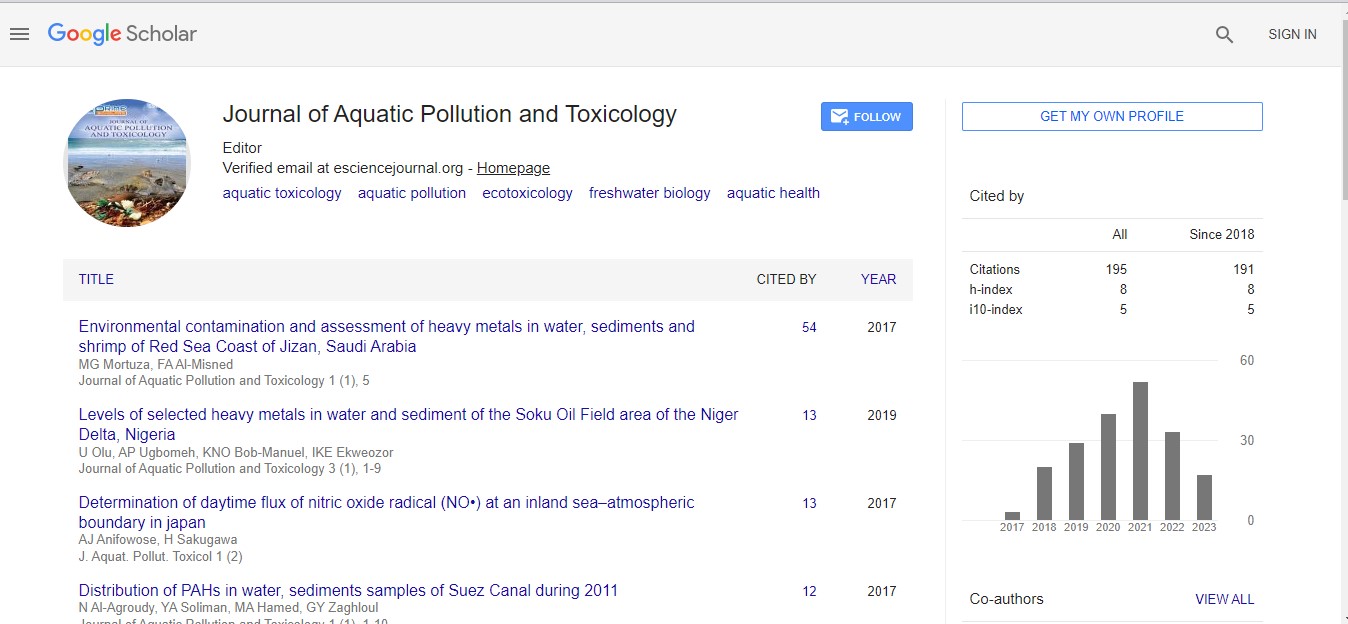Commentary - (2024) Volume 8, Issue 4
Save Water for the Future: A Responsibility We All Share
Erik Conway*
Department of Aquatic Pollution, Vanderbilt University, USA
*Correspondence:
Erik Conway,
Department of Aquatic Pollution, Vanderbilt University,
USA,
Email:
Received: 02-Dec-2024, Manuscript No. IPJAPT-24-22023;
Editor assigned: 04-Dec-2024, Pre QC No. IPJAPT-24-22023 (PQ);
Reviewed: 18-Dec-2024, QC No. IPJAPT-24-22023;
Revised: 23-Dec-2024, Manuscript No. IPJAPT-24-22023 (R);
Published:
30-Dec-2024, DOI: 10.21767/2581-804X-8.4.34
Description
Water is one of the most vital resources on Earth, essential not
only for life but also for agriculture, industry, and the functioning
of ecosystems. Despite its importance, water is becoming
an increasingly scarce commodity due to overconsumption,
pollution, and climate change. With the global population
growing and water resources under mounting pressure, saving
water for the future has never been more urgent. This article
highlights why conserving water is critical, the impact of
water scarcity, and practical steps we can all take to ensure a
sustainable water future. Water is essential for human health,
food production, and economic activities. A lack of access to
clean water not only poses significant health risks, such as
waterborne diseases, but also threatens food security and
hinders economic development. By adopting water-saving
habits today, we can help ensure that future generations
have access to the water they need to survive and thrive.
The consequences of water scarcity are severe: When water
becomes scarce or contaminated, access to clean drinking
water is limited. This leads to the spread of waterborne
diseases like cholera, dysentery, and typhoid, which can
cause widespread illness and death, particularly in developing
countries. When water becomes scarce, crop yields drop,
leading to food shortages and increased prices. Regions heavily
dependent on irrigation for food production are particularly
vulnerable. Industries that rely on large amounts of water, such
as manufacturing, mining, and energy production, may face
shutdowns or relocations due to water shortages. This leads
to economic disruptions, job losses, and reduced productivity.
Over-extraction of water from rivers, lakes, and aquifers can
harm aquatic ecosystems and biodiversity. Wetlands, rivers, and
lakes depend on a stable supply of freshwater to support plant
and animal life. Water scarcity can lead to the collapse of these
ecosystems, threatening the species that depend on them. The
good news is that we can all contribute to water conservation.
Here are some practical ways individuals, communities, and
governments can help save water for the future. A leaky faucet
or running toilet can waste thousands of gallons of water
over the course of a year. Regularly check and fix leaks in your
plumbing. Installing water-saving fixtures, such as low-flow
showerheads, faucets, and toilets, can significantly reduce
water consumption in households. Taking shorter showers and
turning off the tap while brushing your teeth can save gallons
of water every day. Watering plants during the cooler parts
of the day reduces evaporation and ensures that the water
reaches the roots. Native and drought-tolerant plants require
less water and are better suited to your local climate. Mulching
around plants helps retain moisture in the soil, reducing the
need for frequent watering. Techniques such as drip irrigation
deliver water directly to the plant roots, reducing water waste
and improving crop yields. Collecting and storing rainwater for
use in irrigation or other non-potable applications can reduce
the need for freshwater in agriculture. Reusing water from
baths, sinks, and washing machines for irrigation or flushing
toilets is an effective way to reduce freshwater consumption.
Many industries can reuse water in their production processes,
reducing the overall demand for freshwater. Governments
can play a key role in water management by implementing
regulations to promote water efficiency in industries and
agriculture. Improving water storage, distribution systems, and
wastewater treatment plants can help reduce water loss and
improve water availability in urban areas.
Acknowledgement
None.
Conflict Of Interest
The author declares there is no conflict of interest in publishing
this article.
Citation: Conway E (2024) Save Water for the Future: A Responsibility we all Share. J Aquat Pollut Toxicol. 8:34.
Copyright: © 2024 Conway E. This is an open-access article distributed under the terms of the Creative Commons Attribution License, which permits unrestricted use, distribution, and reproduction in any medium, provided the original author and source are credited.

